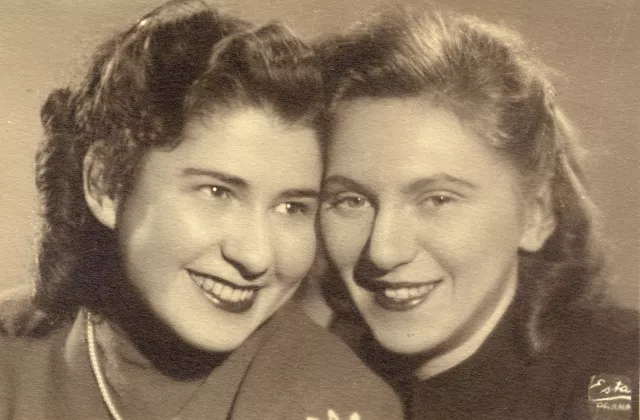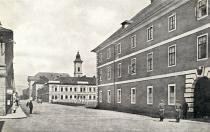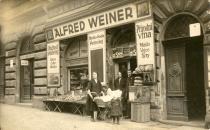Ludmila Rutarova with her cousin Inka Weinerova
This is a picture, taken on 28th December 1941, of me and my cousin Inka Weinerova. Her name was Frantiska, but we called her Inka - in the picture she's the one on the left.
During the war, when things were unpleasant, my parents told me to not go to work anywhere, and to instead help out at home with the housework and cooking, because, of course, at that time we no longer had a servant. I couldn't work in an office, because no one would take me on anywhere. Finally some Mr. Valasek gave my cousin Inka and me jobs in a cartonnage workshop, where we were gluing cardboard boxes together. At first our boss was quite happy with us, telling us how handy we were, how good we were at it. We got to know the young girls that worked there. Together we?d make the boxes, sing songs, and go to a tavern for soup.
Once during lunch, my cousin Inka asked one girl whether our boss was making health insurance payments for us. The girl told her that she didn't know. On payday that girl asked the boss about the insurance. He became enraged and asked her how that had occurred to her, and who?d told her that he was supposed to pay something like that. And so it happened that Boss Velisek summoned Inka, although up to that point he?d always been formal and polite to her, and started yelling at her: ?I?ll catch you by your ass and throw you out the door!? So we both left, the job wasn?t all that great anyway, our pay was about 100 crowns.
Inka and I found another job, at the Hunka bookbindery on Podskalska Street. Mr. Hunka was a Czech, and was an excellent and fair person! The entire Hunka family worked in the bookbindery ? his wife and daughter, as well as his sister-in-law. There I learned to stitch and bind books, to gild the headings with real gold; it was very nice work. I worked there as a bookbinder up until I went into the transport.
Inka arrived in Auschwitz on the second family transport. In Auschwitz, she worked as a housekeeper for some German who worked in the ?Kleiderkammer" the place where clothing that had been confiscated from incoming transports was sorted, searched for hidden valuables, and then shipped to Germany for distribution.
For six months prisoners in the family camp had so-called ?Sonderbehandlung" or ?special treatment? ? families weren?t split up, they for example didn't shave our hair off, and they isolated us in camp BIIb. However, ?Sonderbehandlung? was planned for only six months, followed by death in the gas chambers. The first transport was gassed without prior selection in the night from 8th to 9th of March 1944, on President Masaryk's birthday. Prisoners from the second transport were afraid that once six months after their arrival passed, they?d also be murdered. My cousin Inka had arrived on the second transport, she was afraid, and said that now it was their turn. However, the Nazis decided to not murder all of them, organized a selection, and picked some for the prisoners from the second and third transport for slave labor outside the camp.
I was with Inka during slave labor in Hamburg, and then the transport to Bergen-Belsen, where we lived to see the liberation. Inka left Bergen-Belsen before my mother and I did. After the war, we kept in touch for some time, but I don?t know much about her, she's since died.













































